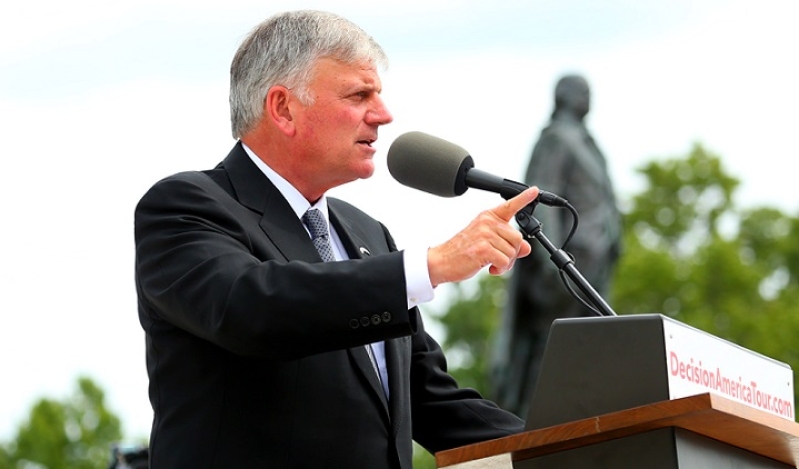
Franklin Graham has shared his thoughts on "conversion therapy" after Democratic lawmakers this week introduced a bill that would ban the controversial practice, arguing that that LGBTQ people were "born perfect; there is nothing to treat them for."
In a Facebook post shared Friday, Graham, the leader of the Billy Graham Evangelistic Association and Samaritan's Purse, said Democrats are "very misled" in their beliefs regarding the gay community.
"We were all born imperfect, with sinful natures-yet loved by God who offers us forgiveness and wholeness through faith in His Son, Jesus Christ," the evangelist charged. "Homosexuality is defined by God as sin, an abomination to Him."
There is one "conversion therapy" that works for all sin, said Graham, and that is asking Jesus Christ to come into our hearts.
"He can transform and heal our lives, making us new," he said. "The Bible tells us, 'Therefore, if anyone is in Christ, he is a new creation. The old has passed away; behold, the new has come' (2 Cor. 5:17)."
The Therapeutic Fraud Prevention Act of 2017 was introduced Tuesday by Rep. Ted Lieu (D-Calif.), along with Sens. Patty Murray (D-Wash.) and Cory Booker (D-N.J.). The Washington Post reports that about 70 other members of Congress, all Democrats, have said they support the bill, which would allow the Federal Trade Commission to "classify conversion therapy and its practitioners as fraudulent."
"The bill is very simple," Lieu told the Post. "It says it is fraud if you treat someone for a condition that doesn't exist and there's no medical condition known as being gay. LGBTQ people were born perfect; there is nothing to treat them for. And by calling this what it should be, which is fraud, it would effectively shut down most of the organizations."
So far, the District of Columbia and seven states including New Mexico, California, Oregon, Illinois, Vermont, and New Jersey, have passed laws forbidding sexual orientation change efforts (SOCE), another term for conversion therapy.
Some Christian leaders have criticized SOCE; Al Mohler, president of the Southern Baptist Theological Seminary, said "reparative therapy is not the way to go" and warned Christians have historically sinned against gays by "reducing a massive human struggle to simplistic explanations."
Proponents of SOCE, however, argue the therapy has been grossly misrepresented by the media: Christopher Doyle, an ex-gay licensed clinical professional counselor, wrote in a Christian Post op-ed, "Gay conversion therapy is a made-up term coined by gay activists to describe a practice where a client is changed from gay to straight - often involving teenagers, against their will, and usually in the case where a religious or unaccepting parent is the impetus. In my clinical experience, I have worked with hundreds of parents and teenagers struggling with sexual and gender identity. Not once have I ever allowed a parent to force or manipulate their child to change.
"As a former homosexual and licensed psychotherapist that specializes in sexual and gender identity, I understand that same-sex attractions and gender confusion are the result of many underlying factors; and when parents heal the wounds and work through dysfunctional patterns within the family, relational and emotional healing occurs with the child. In some cases, this results in a redefinition or new understanding for the child struggling with sexual and gender issues - even a change in the way he or she identifies."
Rosaria Butterfield, a former lesbian and champion for LGBTQ rights, shed further light on the issue and shared her own conversion story in a Desiring God blog post titled "The Dead End of Sexual Sin."
"It was only after I met my risen Lord that I ever felt shame in my sin, with my sexual attraction, with my sexual history," she writes. "Conversion brought with it a train wreck of contradictory feelings, ranging from liberty to shame. Conversion also left me confused."
Butterfield, who has counseled countless young people on college campuses, also spoke openly about the confusion she felt after her conversion: "While it was clear that God forbade sex outside of biblical marriage, it was not clear to me what I should do with the complex matrix of desires and attractions, sensibilities and senses of self that churned within and still defined me," she writes.
The writings of 17th century theologian John Owen were pivotal in opening her eyes: "I was shown how and why the promises of sexual fulfillment on my own terms were the antithesis of what I had once fervently believed." "Instead of liberty, my sexual sin was enslavement...my lesbian desires and sensibilities were dead-end joy-killers."
For Butterfield, the advice to any LGBTQ child or teen - or anyone searching, hurting, and longing for acceptance - is simple: "What then should an unbeliever do? Cry out to God for the Holy Spirit to give him a new heart and convert his soul."






